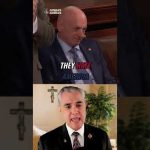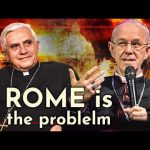An unprecedented letter published by the synod on synodality Wednesday said that the Church should focus more on the idea of synodality ahead of the October 2024 final session of the Church’s years-long consultative process.
The Oct. 25 text also emphasized discipleship of Jesus Christ, and commitment to both service of the poor and protection of the environment.
“We hope that the months leading to the second [Vatican] session in October 2024 will allow everyone to concretely participate in the dynamism of missionary communion indicated by the word ‘synod,’” said the letter, which was addressed to Catholics around the world.
“This is not about ideology, but about an experience rooted in the apostolic tradition,” the letter added.
The letter was published Wednesday afternoon, as more than 300 of the synod on synodality’s delegates deliberate on an interim report they’ll publish later this week. The aim of the synod on synodality is to recommend to the pope how the Church might better engage Catholics around the world in “synodality” — a process of common prayer, listening, and discernment of God’s will for the Church.
“To progress in its discernment, the Church absolutely needs to listen to everyone, starting with the poorest. This requires a path of conversion on its part, which is also a path of praise,” the letter said.
“It means listening to those who have been denied the right to speak in society or who feel excluded, even by the Church; listening to people who are victims of racism in all its forms – in particular in some regions to indigenous peoples whose cultures have been scorned. Above all, the Church of our time has the duty to listen, in a spirit of conversion, to those who have been victims of abuse committed by members of the ecclesial body, and to commit herself concretely and structurally to ensuring that this does not happen again.”
While the letter referenced the victims of clerical sexual abuse, the synod on synodality has not focused on that topic, Cardinal Robert Prevost told reporters Wednesday, despite global pushback on the Vatican’s handling of several high-profile abuse cases, including that of disgraced former Jesuit Marko Rupnik, who is believed by many Catholics to have been protected amid allegations of serial sexual abuse.
For its part, the letter “to the People of God,” published by the synod, said that listening will help the Catholic Church to better reach people with the Gospel.
“The Church also needs to listen to the laity, women and men, all called to holiness by virtue of their baptismal vocation: to the testimony of catechists, who in many situations are the first proclaimers of the Gospel; to the simplicity and vivacity of children, the enthusiasm of youth, to their questions, and their pleas; to the dreams, the wisdom and the memory of elderly people. The Church needs to listen to families, to their educational concerns, to the Christian witness they offer in today’s world. She needs to welcome the voice of those who want to be involved in lay ministries and to participate in discernment and decision-making structures,” the synod said.
“To progress further in synodal discernment, the Church particularly needs to gather even more the words and experience of the ordained ministers: priests, the primary collaborators of the bishops, whose sacramental ministry is indispensable for the life of the whole body; deacons, who, through their ministry, signify the care of the entire Church for the most vulnerable. She also needs to let herself be questioned by the prophetic voice of consecrated life, the watchful sentinel of the Spirit’s call. She also needs to be attentive to all those who do not share her faith but are seeking the truth, and in whom the Spirit, who ‘offers everyone the possibility of being associated with this paschal mystery,’ is also present and operative.”
The text emphasized fidelity to Jesus Christ.
“The thirst for unity increases in the silent contemplation of the crucified Christ,” the synod wrote.
“In fact, the cross is the only cathedra of the One who, having given himself for the salvation of the world, entrusted His disciples to His Father, so that ‘they may all be one.’ Firmly united in the hope brought by His Resurrection, we entrusted to Him our common home where the cries of the earth and the poor are becoming increasingly urgent: ‘Laudate Deum!,’ as Pope Francis reminded us at the beginning of our work.”
The synod on synodality has been a unique global consultative process, called for by Pope Francis, which began with parish and diocesan consultation meetings in 2021. The meetings aimed to ask priests, religious, lay people and bishops how the Church could better synodality in its decision-making structures.
This month, more than 360 delegates — including an unprecedented number of non-bishops – have met for weeks at the Vatican for a session of the Church’s “synod of bishops” on the topic of synodality.
It is unprecedented in modern times for a synodal assembly to send a letter directly to the other members of the Church — typically, the purpose of the group’s meeting is to make recommendations to the pope, before he sends a letter, called an apostolic exhortation, to the Church.
The eventual papal exhortation is expected to be published sometime after a second Vatican meeting of the synod delegates, which will be held next October.
But on Monday, the synodal delegates approved by applause a draft text suggested by some participants to serve as a “Letter to the People of God.” After minor revisions were considered this week, the assembly approved the final text Wednesday afternoon.















